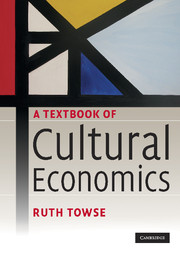Book contents
- Frontmatter
- Contents
- List of figures
- List of tables
- List of boxes
- List of abbreviations
- Preface
- Part I General issues in cultural economics
- Introduction
- 1 Introduction to cultural economics
- 2 Economic profile of the cultural sector
- 3 Markets for cultural goods and services
- 4 Economic organisation of the creative industries
- 5 Production, costs and supply of cultural goods
- 6 Consumption of cultural goods and services
- 7 Welfare economics and public finance
- Part II The ‘traditional’ economics of the arts and heritage
- Part III Artists' labour markets and copyright
- Part IV The creative industries
- Part V Conclusion and exercises and problems
- References
- Index
5 - Production, costs and supply of cultural goods
- Frontmatter
- Contents
- List of figures
- List of tables
- List of boxes
- List of abbreviations
- Preface
- Part I General issues in cultural economics
- Introduction
- 1 Introduction to cultural economics
- 2 Economic profile of the cultural sector
- 3 Markets for cultural goods and services
- 4 Economic organisation of the creative industries
- 5 Production, costs and supply of cultural goods
- 6 Consumption of cultural goods and services
- 7 Welfare economics and public finance
- Part II The ‘traditional’ economics of the arts and heritage
- Part III Artists' labour markets and copyright
- Part IV The creative industries
- Part V Conclusion and exercises and problems
- References
- Index
Summary
This chapter deals with the supply of cultural goods and services and with the economic aspects of their production. The first stage of production in the creative industries is creativity, and that may be generated by individuals or by enterprises; in economic terms, though, we can also regard artists and others involved in ‘primary’ creative activity as producers. Supply to the market is made up of individual producers deciding how much to supply at different prices; what influences their decisions affects supply. The most important economic factor affecting supply is the cost of production and, in the chapter, various types of costs are analysed. Some producers are motivated only by profit, others are non-profit firms with other objectives; some have a monopoly position in the market while others operate in a competitive market. All these factors affect supply, the prices of cultural goods, which goods and services are produced, firms' revenues and, ultimately, how creators are rewarded.
Creativity
The starting point for all cultural supply is something we can call ‘creativity’. The people who create new work can be called ‘artists’ as a general term. Creativity may be defined in many ways and much has been written about it by social psychologists, philosophers, art historians, musicologists, critics, and so on, and lately by the authors of the UNCTAD (2008) Creative Economy Report 2008.
- Type
- Chapter
- Information
- A Textbook of Cultural Economics , pp. 104 - 134Publisher: Cambridge University PressPrint publication year: 2010



